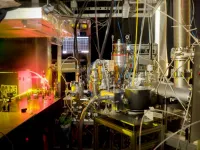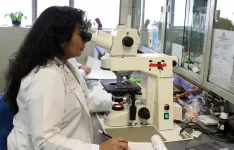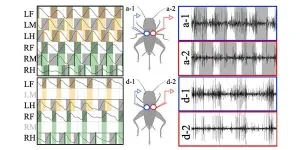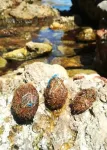INFORMATION:
For more information, please contact
Emma McKinney,
Communications Manager, University of Birmingham, on
+44 7815607157.
Alternatively, contact the Press Office out of hours on +44 (0)7789 921165.
Notes to Editors
The University of Birmingham is ranked amongst the world's top 100 institutions, and its work brings people from across the world to Birmingham, including researchers and teachers and more than 6,500 international students from nearly 150 countries.
Wood et al (Jan, 2021). 'Breastfeeding promotes early neonatal regulatory T cell expansion and immune tolerance of non-inherited maternal antigens'. Allergy. DOI: 10.1111/all.14736
Read the paper here: https://onlinelibrary.wiley.com/doi/10.1111/all.14736
The National Institute for Health Research (NIHR) is the nation's largest funder of health and care research. The NIHR:
Funds, supports and delivers high quality research that benefits the NHS, public health and social care
Engages and involves patients, carers and the public in order to improve the reach, quality and impact of research
Attracts, trains and supports the best researchers to tackle the complex health and care challenges of the future
Invests in world-class infrastructure and a skilled delivery workforce to translate discoveries into improved treatments and services
Partners with other public funders, charities and industry to maximise the value of research to patients and the economy
The NIHR was established in 2006 to improve the health and wealth of the nation through research, and is funded by the Department of Health and Social Care. In addition to its national role, the NIHR supports applied health research for the direct and primary benefit of people in low- and middle-income countries, using UK aid from the UK government.
Research reveals new insight into why breastfed babies have improved immune systems
2021-01-14
(Press-News.org) Research led by the University of Birmingham and Birmingham Women's and Children's NHS Foundation Trust has revealed new insight into the biological mechanisms of the long-term positive health effects of breastfeeding in preventing disorders of the immune system in later life.
Breastfeeding is known to be associated with better health outcomes in infancy and throughout adulthood, and previous research has shown that babies receiving breastmilk are less likely to develop asthma, obesity, and autoimmune diseases later in life compared to those who are exclusively formula fed.
However, up until now, the immunological mechanisms responsible for these effects have been very poorly understood. In this new study, researchers have for the first time discovered that a specific type of immune cells - called regulatory T cells - expand in the first three weeks of life in breastfed human babies and are nearly twice as abundant as in formula fed babies. These cells also control the baby's immune response against maternal cells transferred with breastmilk and help reduce inflammation.
Moreover, the research - supported by the National Institute for Health Research's Surgical Reconstruction and Microbiology Research Centre (NIHR SRMRC) - showed that specific bacteria, called Veillonella and Gemella, which support the function of regulatory T cells, are more abundant in the gut of breastfed babies.
The results of the study, published in Allergy, emphasise the importance of breastfeeding, say the researchers.
Senior author Gergely Toldi, researcher at the University of Birmingham and consultant neonatologist at Birmingham Women's and Children's NHS Foundation Trust, said: "The influence of the type of milk received on the development of the immune response has not previously been studied in the first few weeks of life.
"Prior to our research the outstanding importance and the early involvement of this specific cell type in breastfed babies was unknown.
"We hope this invaluable new insight will lead to an increase in rates of breastfeeding and will see more babies benefit from the advantages of receiving breastmilk.
"Furthermore, we hope for those babies who are formula fed, these results will contribute to optimising the composition of formula milk in order to exploit these immunological mechanisms.
"We are very grateful for the mums and babies who contributed to this special project."
The study is the culmination of a unique three-year research project analysing data from 38 healthy mothers and their healthy babies. Small amounts of blood and stool samples were collected at birth at Birmingham Women's Hospital and then again later during home visits when the babies were three weeks old. Sixteen out of the 38 babies (42%) were exclusively breastfed for the duration of the study, while nine babies received mixed feeding, and 13 babies were exclusively formula-fed.
The researchers hope to now further study this biological mechanism in sick and pre-term newborn babies who have developed inflammatory complications.
The research was carried out by a team working across the University of Birmingham's Institutes of Immunology and Immunotherapy; Cancer and Genomic Studies; Microbiology and Infection; and Metabolism and Systems Research, as well as the Department of Neonatology at Birmingham Women's and Children's NHS Foundation Trust, and NIHR SRMRC based at University Hospitals Birmingham NHS Foundation Trust.
ELSE PRESS RELEASES FROM THIS DATE:
How aerosols are formed
2021-01-14
Aerosols are suspensions of fine solid particles or liquid droplets in a gas. Clouds, for example, are aerosols because they consist of water droplets dispersed in the air. Such droplets are produced in a two-step process: first, a condensation nucleus forms, and then volatile molecules condense onto this nucleus, producing a droplet. Nuclei frequently consist of molecules different to those that condense onto them. In the case of clouds, the nuclei often contain sulphuric acids and organic substances. Water vapour from the atmosphere subsequently condenses onto these nuclei.
Scientists led by Ruth Signorell, Professor at the Department of Chemistry and Applied ...
Cancer research reveals how mutations in a specific gene cause different types of disease
2021-01-14
Leading cancer experts at the University of Birmingham have solved a long-standing question of how various types of mutations in just one gene cause different types of diseases.
A team of scientists at the University's Institute of Cancer and Genomic Sciences, led by Professor Constanze Bonifer, studied a gene known as RUNX1, which is responsible for providing instructions for the development of all blood cells and is frequently mutated in blood cancers.
The results of their research has shown that the balance of cells types in the blood is affected much earlier than previously thought, which is particularly important for families that carry ...
How insects activate muscles to adapt to limbs removed
2021-01-14
Adaptability explains why insects spread so widely and why they are the most abundant animal group on earth. Insects exhibit resilient and flexible locomotion, even with drastic changes in their body structure such as losing a limb.
A research group now understands more about adaptive locomotion in insects and the mechanisms underpinning it. This knowledge not only reveals intriguing information about the biology of the insects, but it can also help to design more robust and resilient multi-legged robots that are able to adapt to similar physical damage.
The insect nervous system is comprised of approximately 105 to 106 neurons. Understanding ...
Posidonia marine seagrass can catch and remove plastics from the sea
2021-01-14
Posidonia oceanica seagrass -an endemic marine phanerogam with an important ecological role in the marine environment- can take and remove plastic materials that have been left at the sea, according to a study published in the journal Scientific Reports. The article's first author is the tenure-track 2 lecturer Anna Sànchez-Vidal, from the Research Group on Marine Geosciences of the Faculty of Earth Sciences of the University of Barcelona (UB).
The study describes for the first time the outstanding role of the Posidonia as a filter and trap for plastics in the coastal areas, and it is pioneer ...
Faeces and algorithms: Artificial Intelligence to map our intestinal bacteria
2021-01-14
Both past and present-day scientists have suspected the intestines of playing a role in various diseases. Present-day studies focus on the intestinal flora's role in physical diseases such as diabetes and overweight, while others seek to establish a connection between the intestinal flora and e.g. autism, schizophrenia and depression. But even modern-day scientists have difficulties studying the around 500-1000 different species among the approx. 100 billion active bacteria in our intestines.
Therefore, researchers from the University of Copenhagen have developed a ground-breaking technique that ...
Teeth pendants speak of the elk's prominent status in the Stone Age
2021-01-14
Roughly 8,200 years ago, the island of Yuzhniy Oleniy Ostrov in Lake Onega in the Republic of Karelia, Russia, housed a large burial ground where men, women and children of varying ages were buried. Many of the graves contain an abundance of objects and red ochre, signifying the wish to ensure the comfort of the buried also after death. Pendants made of elk incisors were apparently attached to clothing and accessories, such as dresses, coats, cloaks, headdresses and belts. Although no clothing material has been preserved, the location of the elk teeth sheds light on the possible type of these outfits.
A people of grooved elk tooth pendants
A study headed by archaeologist Kristiina Mannermaa, University of Helsinki, aimed to determine who ...
Greenland melting likely increased by bacteria in sediment
2021-01-14
Bacteria are likely triggering greater melting on the Greenland ice sheet, possibly increasing the island's contribution to sea-level rise, according to Rutgers scientists.
That's because the microbes cause sunlight-absorbing sediment to clump together and accumulate in the meltwater streams, according to a Rutgers-led study - the first of its kind - in the journal Geophysical Research Letters. The findings can be incorporated in climate models, leading to more accurate predictions of melting, scientists say.
"These streams can be seen all over Greenland ...
Bladder cancer -- When to use chemotherapy
2021-01-14
In patients with bladder cancer, chemotherapy effectiveness is partially determined by the body's immune system response to the malignancy. This is the conclusion of research conducted by a team of scientists from Charité - Universitätsmedizin Berlin and the Berlin Institute of Health. The findings, which have been published in Science Translational Medicine*, can be used to predict treatment success and may increase survival in patients with bladder cancer.
Bladder cancer is one of the ten most common types of cancer in Germany, and one of the five most common cancers in men. Nationwide, the disease affects approximately 30,000 people a year. The risk of the cancer ...
Moffitt researchers discover biochemical pathway that protects cells from ferroptosis
2021-01-14
TAMPA, Fla. -- The hallmarks of cancer include rapid cell reproduction and metabolic activity. But these processes also lead to increased cellular stress and oxidation, and the risk of cell death. To circumvent these negative consequences of supercharged growth, cancer cells stimulate pathways to reduce oxidative stress and avoid cell death. In an article published in Cell Metabolism, Moffitt Cancer Center researchers report on a newly discovered biochemical pathway that protects cells from a type of cell death called ferroptosis.
Ferroptosis is a specialized type of cell death that is caused ...
MicroRNA may serve as therapeutic targets for traumatic brain injury
2021-01-14
Scientists at the Walter Reed Army Institute for Research have shown that microRNA biomarkers related to Alzheimer's disease play a role in brain damage caused by traumatic brain injury.
TBI or brain trauma results from blows to the head, leading to chronic disruption of the brain and a cascade of long-term health conditions. Patients who suffer from TBI are at much higher risk of developing neurodegenerative disease or dementia, particularly Alzheimer's disease. The mechanism behind this relationship remains understudied, making the development effective therapeutics challenging.
MiRNAs are small pieces of genetic material that play a critical role in normal gene expression. Yet, studies have also linked abnormal miRNA levels, or dysregulation, to a range of diseases including neurodegenerative ...







